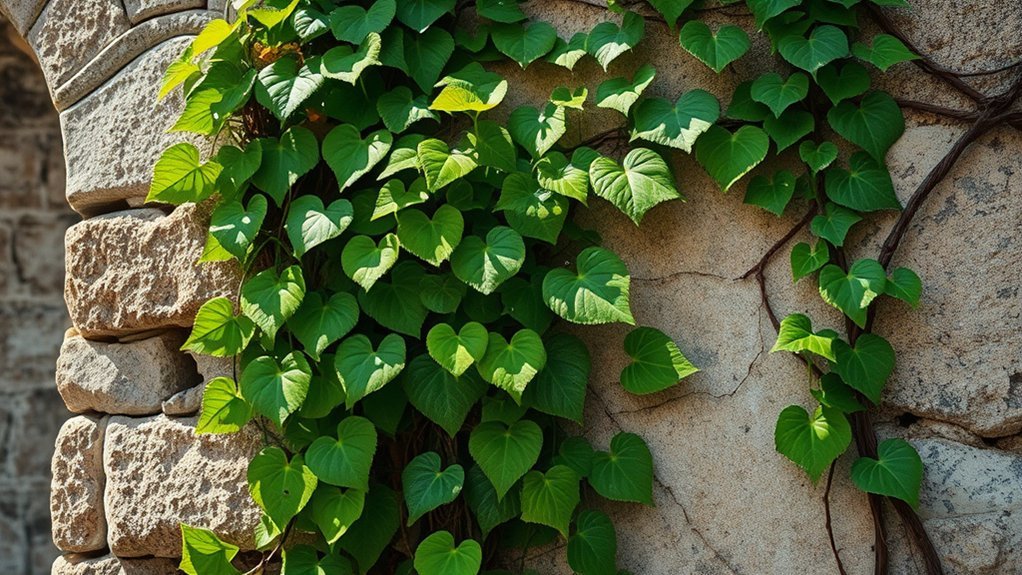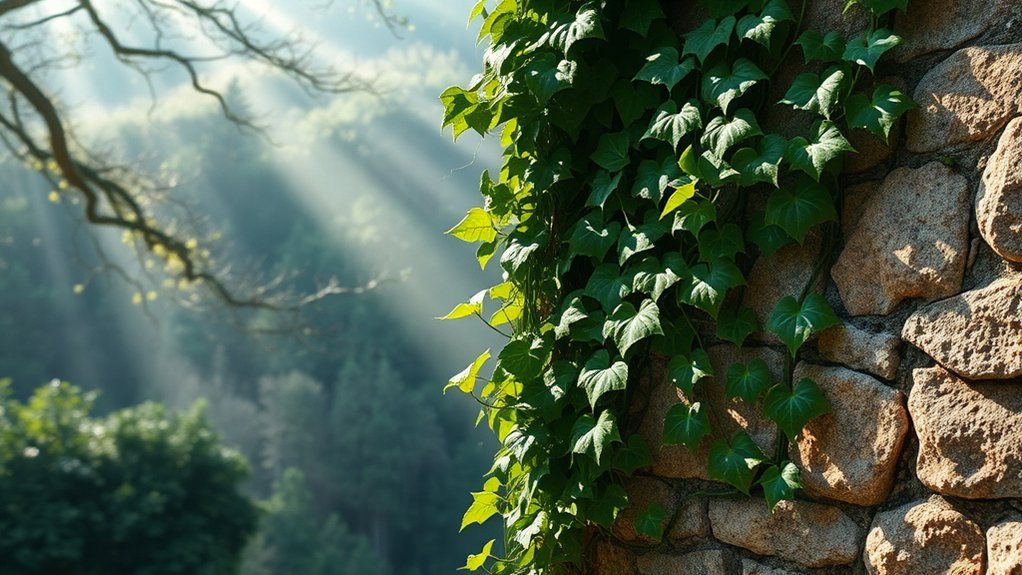Ivy is a symbol of loyalty and commitment. It shows how strong human connections can be over time. Ivy clings to things, like walls and trees, just like how strong relationships hold on tight.
Looking into ivy's history and how different cultures use it can help us understand its meaning better. This can give us clues about our own relationships and commitments. So, what does ivy say about how we connect with each other?
Key Takeaways
Ivy stands for loyalty and true love. It shows the strong bonds between friends and partners that last a long time.
Ivy clings to things. This clinging symbolizes loyalty and the strength of relationships. It reminds us how important friendships and commitments are throughout life.
People have used ivy in celebrations for a long time. It often appears in rituals and decorations, showing its role in love and unity.
In stories and poems, ivy represents lasting connections. It captures the feelings we have for each other in relationships.
When you give ivy as a gift during special moments, it shows trust and support. It also helps keep friendships strong and close.
Historical Significance of Ivy in Ancient Cultures

Ivy has been important in many cultures throughout history. In ancient times, people saw it as a symbol of strength and loyalty. They used ivy in different rituals. For example, they made garlands from ivy to wear during ceremonies for gods like Bacchus and Venus. People thought that ivy's ability to cling to walls showed their wish for stability and connection.
Ivy was also used in funerals. People decorated graves with ivy to represent eternal life and memory. Including ivy in these special traditions helped people feel a sense of belonging and continuity.
The plant's green leaves also reminded them of their commitment, bringing together generations who shared a love for this thick, crawling vine.
The Symbolism of Loyalty and Fidelity
Ivy is more than just a pretty green plant. It stands for loyalty and fidelity. Many cultures have used ivy as a sign of strong commitment for a long time.
Ivy can cling tightly to walls and trees, showing how love and friendship can last through tough times. People often give ivy as a gift during important moments, like weddings or anniversaries, to show their lasting feelings.
When you think about ivy, remember that it symbolizes deep connections. It reminds you and those around you that true loyalty grows strong, just like this hardy plant.
Ivy isn't just beautiful; it also carries important values of loyalty and fidelity that we can all appreciate.
Ivy in Literature and Poetry

Ivy is a popular symbol in books and poems. It often shows ideas like strength, connection, and how our lives connect with others. You can see ivy in stories from many different times.
For example, in Shakespeare's play "Twelfth Night," ivy represents loyalty and lasting love. This shows how relationships can hold strong, even during tough times.
Poets like Robert Frost also use ivy in their works. They connect it to life's challenges, reminding us that, like ivy, we need to grow and keep going.
In these writings, ivy stands for our wish to belong. It reminds us that the bonds we create with others can last a long time.
The Role of Ivy in Wedding Ceremonies
Many couples pick flowers for their wedding decorations, but ivy can bring a special meaning to your ceremony. This evergreen plant stands for fidelity and eternal love. Using ivy can help express your feelings on this important day.
Ivy can create beautiful bridal bouquets and decorations. Its green vines can hang down, showing how your lives are coming together. You can do more with ivy than just use it for decoration. Think about including ivy in your vows. You might wrap ivy around your hands when you hold them together, or use it to tie a knot. These gestures can make your promise to each other even stronger.
Decorating with ivy helps create a timeless feeling, celebrating your love. It can make your wedding day even more special and meaningful.
Folklore and Myths Surrounding Ivy

Adding ivy to your wedding ceremony is a lovely idea. Ivy stands for loyalty and love, and it has a lot of interesting stories behind it. Many tales say that ivy can keep bad spirits away. This makes it a protective flower for your love and marriage.
In ancient Greece, people connected ivy to Dionysus, the god of wine. Ivy represented new beginnings and everlasting love. Ivy grows by clinging to things, which is like how couples stay close to each other.
Ivy's twisting nature in stories shows how love can be beautiful and complicated, just like vines that wrap around each other. When you include ivy in your wedding, you celebrate your love while also respecting the history of strength and commitment it brings. This makes your special day even more meaningful.
Ivy as an Emblem of Friendship
Ivy is a strong symbol of friendship. It stands for loyalty and the lasting connections we share with our friends. Just like ivy grows and holds on tightly to surfaces, true friends stick together through tough times. When you give ivy as a gift, you share a message of trust and support.
Ivy reminds us that good friends help each other out. As it grows, so do our friendships, becoming richer and more meaningful. Bringing ivy into your life, or giving it to a friend, can strengthen your bond.
It serves as a special reminder of love and loyalty between you and your friends.
The Psychological Impact of Ivy in Relationships
Friendship is important for many relationships. It can give us feelings of safety and belonging. Ivy spreads and grows by sticking to things. This behavior shows how friendships can grow and connect us deeply. When we make our friendships strong, like ivy, we create more positive moments together.
But we should also be careful. Sometimes, we can depend too much on our friends. While it feels good to be close, too much reliance can stop us from growing as individuals. It's essential to find a balance between being close and having our independence.
Remember, strong connections don't need us to be together all the time. They grow when we help each other become better people. By understanding the different parts of relationships, we can build strong friendships and still keep our own identities.
Let's cherish our bonds but also grow on our own!
Ivy in Art and Symbolic Representations
Artists have always liked ivy because it looks nice, but it means more than just that. Ivy stands for loyalty and lasting connections. This makes it a strong symbol in many kinds of art. You can see ivy in old paintings and new sculptures. The way its vines twist together shows how people can be linked for a long time.
Artists use ivy not just for how it looks. They want to tell deeper stories about love and strength in relationships. By adding ivy to their work, they help viewers feel emotions and think about their own connections.
Modern Uses of Ivy in Home Decor
Using ivy in your home decor can make your space look beautiful and meaningful. Ivy is a symbol of friendship and loyalty, and it can help create a warm atmosphere.
Here are some easy and fun ways you can use ivy in your home:
- Hang ivy wreaths on your door for a pretty welcome.
- Drape ivy garlands over mantels or shelves to add a touch of style.
- Create ivy wall art to bring nature inside your home.
- Use ivy arrangements in decorative pots as eye-catching centerpieces and good conversation starters.
- Set out ivy centerpieces on your table to greet guests with a cozy vibe.
Bringing ivy into your decor is a simple way to make your home feel inviting and lovely!
Caring for Ivy: A Lesson in Commitment
Caring for ivy is a simple and rewarding task. This plant does best when you pay attention to what it needs. Ivy enjoys indirect sunlight, so find a nice spot away from harsh rays.
Water your ivy regularly, but don't drown it! Let the soil dry out a bit between waterings. This keeps the plant happy and healthy.
If you want to grow more ivy, try stem cuttings in the spring. It's a fun way to create new plants!
Pruning your ivy is important too. Cut off any dead or long branches. This helps the plant grow fuller and keeps it free from disease.
By taking care of your ivy, you build a strong bond with it. Together, you can create a lovely green space that shows your commitment.
Enjoy your time with this beautiful plant!
Frequently Asked Questions
Can Ivy Be Toxic to Pets or Humans?
Ivy can be toxic to both pets and humans. If you have pets, make sure to keep ivy plants out of their reach. If a pet eats ivy, it can cause vomiting or diarrhea. So, if your pet gets into ivy, keep a close eye on them.
If a person swallows ivy, it can also lead to sickness. Symptoms might include stomach pain or a rash. It's best to avoid eating any part of the ivy plant.
To stay safe, enjoy the beauty of ivy by keeping it in places that pets and kids can't reach!
How Can I Propagate Ivy for Home Gardening?
To grow new ivy plants, start by taking cuttings from healthy stems. Each cutting should have little bumps called nodes. These nodes will help the plant grow roots.
Next, use soil that drains well. You want the soil to be damp, but not too wet. It's important to keep the soil moist, but don't soak it.
Place your cuttings in a spot where they can get bright, indirect sunlight. This will help them grow strong without burning the leaves.
With a little care, you can enjoy beautiful ivy vines in your garden. They will add a lovely touch to your outdoor space!
What Are Common Pests That Affect Ivy Plants?
Ivy plants can attract some common pests. Look out for aphids, spider mites, and scale. These bugs can harm your plants. Check your ivy regularly for any signs of these pests. If you find them, take care of your ivy with proper methods. This will help keep your plants healthy and stop infestations before they start. Happy planting!
Is Ivy Suitable for Indoor or Outdoor Planting?
Ivy grows well both inside and outside. When you plant it indoors, it can help clean the air and add a nice green touch to your home. If you plant it outside, it grows quickly and can help cover walls and stop soil from washing away. Think about where you want to plant it to make the most of these benefits!
How Often Should I Water My Ivy Plant?
Water your ivy plant every 1 to 2 weeks. This time depends on how humid and bright your home is. Check the soil to see if it feels dry. If it does, give your plant some water. This helps your ivy stay healthy and grow well. Adjust how often you water based on the conditions around your plant.

Hello, I’m Zephyra, your guide at SpiritualityEssence.com. I’m passionate about uncovering life’s mysteries and sharing transformative insights. Let’s explore mindfulness, ancient rituals, and the path to a more awakened life together. Join me on this spiritual journey!

















